The RIMFI strongly believes in incorporating students into research endeavors to expose young professionals to careers in fisheries science and management. Through these collaborations with scientists, managers and stakeholders, students are able to contribute to applied research. Many of the projects represent University of Rhode Island graduate students’ doctoral or masters research projects, which provides them the opportunity to see how their research can translate to informative management decisions. The RIMFI also allows undergraduate students the opportunity to be involved in research and learn how marine science projects are conducted through field and laboratory sampling, analyzing data, and presenting components of the research. Below are previous and/or current graduate students supported by RIMFI projects.
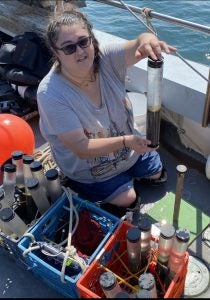 Shaina Harkin
Shaina Harkin
M.S. student in Oceanography
I am working toward my M.S. in Biological Oceanography in the Collie lab at the Graduate School of Oceanography. I am studying coastal benthic ecology in Narragansett Bay utilizing RIMFI’s collaborative effort between URI and RIDEM. Specifically, my project focuses on long-term changes in epifaunal and macrofaunal benthic community structure and biomass in relation to temperature change, nutrient input, and the interaction between these two variables in influencing upper bay eutrophication and hypoxia. Through RIMFI, I am not only able to access the long-term weekly data of the GSO trawl surveys, but also the long-term monthly and seasonal data of the RIDEM trawl surveys, as well as their biannual upper bay quahog dredge surveys, to create a more complete spatiotemporal picture of benthic community structure throughout the Bay. Coincident with the current benthic core and beam trawl samples collected from upper, mid, and lower bay stations in June of 2021 and 2022, this pool of benthic abundance and biomass data should help elucidate the gap of benthic production within Narragansett Bay food web models.
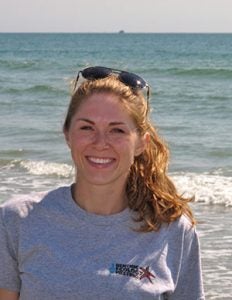 Julia Livermore
Julia Livermore
Ph.D. student in Marine Affairs
I am a current Ph.D. student in the Department of Marine Affairs, as well as the Deputy Chief of the Division of Marine Fisheries at RIDEM. I have a master’s in Coastal Environmental Management and a certificate in geospatial analysis from Duke University, and a bachelor’s degree from Bowdoin College in biology and environmental studies. My graduate research is focused on developing fishery-dependent data products to better inform fisheries management and offshore development decision-making. While commercial fishing in New England involves extensive data reporting on the part of the harvesters and dealers, most data streams are designed for the purpose of fisheries enforcement and tracking of effort and harvest, rather than characterizing fishing activities. This has created challenges for fishery managers, as planning for offshore wind and aquaculture, as well as fishery management in general, are not able to effectively incorporate potential effects of management changes to commercial fishing operations. Thus, my research efforts are designed to collect additional data and insight from commercial fishermen to generate data products that better demonstrate spatial area utilization and business efficiency in harvest.
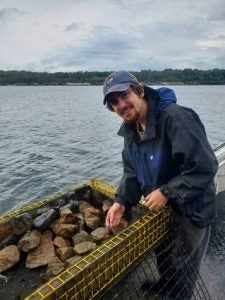 Declan McCormick
Declan McCormick
M.S. student in Oceanography
I am currently a graduate student pursuing an M.S degree in Oceanography at the University of Rhode Island. My research is focused on studying the early life history of American lobsters (Homarus americanus) in Southern New England by determining the abundance and spatial distribution of juvenile lobsters in coastal Rhode Island waters. As environmental conditions continue to change, understanding the status of lobsters throughout their life history is increasingly important. I am appreciative of our collaboration with RIMFI on this project as I have gained valuable insights connecting with the many people involved in the ongoing partnership among scientists, fishermen, and stakeholders alike. I look forward to my continued collaboration with RIMFI on this project and others in the future.
Mike Potter 
M.S. student in Oceanography
I am a graduate student working toward my master’s degree at URI’s Graduate School of Oceanography working in the Oviatt lab. My primary research interests center around the impact human activity has on marine ecosystems, particularly with respect to pollution, climate change, and food web dynamics. My current research and the basis for my master’s thesis involves using experimental mesocosms to investigate climate change and associated factors on the response of the Northern Quahog (Mercenaria mercenaria), known also as the hard clam. The aim of this research is to improve the understanding of Narragansett Bay ecology, the role climate change will play in the future of clam, and support informed management governing the recreational and commercial use of the species.”
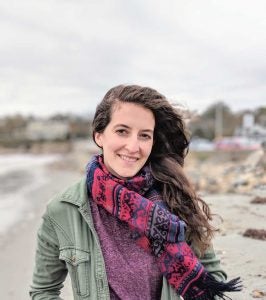 Corinne Truesdale
Corinne Truesdale
Ph.D. student in Oceanography
My dissertation is focused on the emerging southern New England Jonah crab fishery, which has become a valuable component of the Rhode Island commercial fishing industry. In my research, I aim to develop population simulation models and work collaboratively with stakeholders to develop and assess harvest control rules for the Jonah crab fishery. Throughout my graduate career, RIMFI has provided a forum for interaction and collaboration with a diverse group of stakeholders and academic researchers who have provided invaluable guidance and feedback throughout the research process.
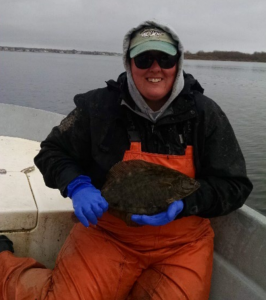 Katie Rodrigue
Katie Rodrigue
M.S. student in Ecology and Ecosystem Sciences
My research will focus on assessing the blue crab population in Narragansett Bay using data from the newly established RI DEM Winter Dredge Survey. Although currently only a small recreational fishery exists for blue crab in Rhode Island, some research suggests that blue crab population density may increase in the future due to milder winters brought on by climate change. To date, no assessment of their population in Rhode Island waters has been conducted. With increasing interest in blue crab harvest from the commercial industry, more robust data needs to be collected and analyzed to inform future management decisions. The partnerships and collaborations made possible by the Rhode Island Marine Fisheries Institute are critical for effectively assessing this data-limited fishery, as well as allowing me to gain invaluable feedback and experience as a fisheries biologist.
RIMFI Student Alumni
Joe Langan
Joe received his Ph.D. in Oceanography for the URI Graduate School of Oceanography and a M.S. in Statistics. Joe’s dissertation was focused on understanding how climate change impacts winter flounder in Narragansett Bay. Joe is currently a postdoc with the University of Alaska Fairbanks researching climate influences on salmon populations.
Maggie Heinichen
Maggie received her M.S. in Oceanography from the URI Graduate School of Oceanography. Her research involved predicting impacts on fish populations and trophic interactions from changes in climate in Narragansett Bay using food web models. Maggie currently works for the Northeast Fisheries Science Center.
Corinne Truesdale
Corinne received her M.S. in Oceanography from the URI Graduate School of Oceanography and a professional master’s degree (M.M.A.) in Marine Affairs from the URI College of Environment and Life Sciences. Corinne led RIMFI projects Fishery and Biological Characteristics of Jonah crab in Rhode Island Sound and Collecting Fishers’ Knowledge to Inform Jonah Crab Research and Management. She currently works for RIDEM Division of Marine Fisheries.
Annie Innes-Gold
Annie received her M.S. in Ecology and Ecosystem Sciences at the URI College of the Environment and Life Sciences. Annie’s research contributed to the RIMFI project Developing a coupled social-ecological ecosystem model of narragansett bay fisheries using ecopath. Annie coupled a Narragansett Bay food-web model to a recreational fishers’ behavior model, creating a dynamic social-ecological representation of the ecosystem. Upon graduating from URI, Annie will pursue a Ph.D. at the University of Hawaii.
Natalie Ameral
Natalie received her M.S. in Evolution and Marine Biology at the URI College of the Environment and Life Sciences. Natalie’s research contributed to the RIMFI project Assessing Atlantic Horseshoe Crab (Limulus polyphemus) population structure within southern New England. Natalie now works as a research lab manager at Mass General Hospital in the field of genome editing.
Educational RIMFI Highlights
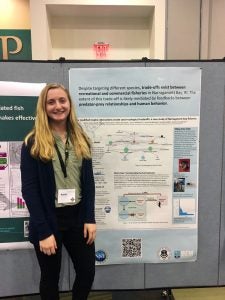 At the 2019 ‘Ecopath 35 years – Making Ecosystem-Based Management Operational’ Conference in Florida, M.S. candidate Annie Innes-Gold one the best poster award for her poster titled “How modified trophic interactions create socio-ecological tradeoffs: a case study of Narragansett Bay fisheries”.
At the 2019 ‘Ecopath 35 years – Making Ecosystem-Based Management Operational’ Conference in Florida, M.S. candidate Annie Innes-Gold one the best poster award for her poster titled “How modified trophic interactions create socio-ecological tradeoffs: a case study of Narragansett Bay fisheries”.
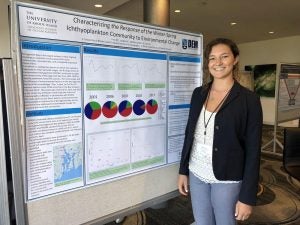 Ph.D. candidate Joseph Langan received best student talk at the winter Southern New England Chapter Meeting of the American Fisheries Society for his talk, titled ‘Atlantic cod in southern New England: Are they climate deniers.’
Ph.D. candidate Joseph Langan received best student talk at the winter Southern New England Chapter Meeting of the American Fisheries Society for his talk, titled ‘Atlantic cod in southern New England: Are they climate deniers.’
In 2018 at the 42nd Annual Larval Fish Conference in British Columbia, URI undergraduate Alison Frey won the Grace Klein-MacPhee award for her poster on ‘Characterizing the response of the winter-spring ichthyoplankton community to environmental change.’
At URI’s Annual Undergraduate Fellows Poster Symposium, Patrick Wilson won 3rd place for his poster on ‘Understanding toxic Pseudo-nitzschia blooms in Narragansett Bay.’
 Home
Home Browse
Browse Close
Close Events
Events Maps
Maps Email
Email Brightspace
Brightspace eCampus
eCampus


